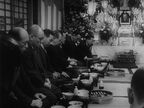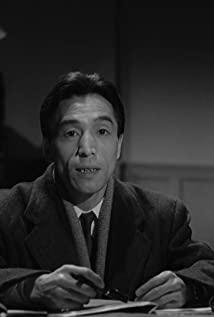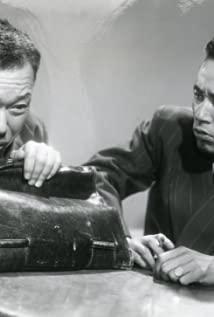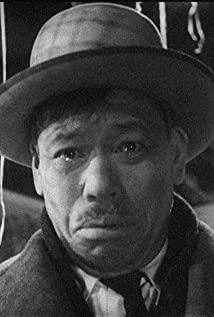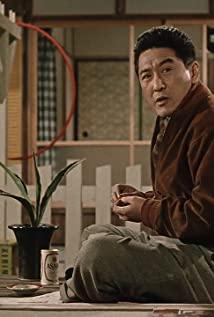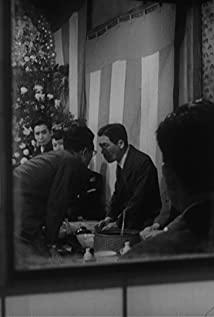Director Akira Kurosawa used the various encounters and behaviors of the protagonist Mr. Watanabe when he was about to die in "Desire to Live", which caused the audience to think deeply about how to live. The director strips him from the complex relationships of the world and makes him face death, the experience of near-death. At this time, everyone will face up to the question of the meaning of life like the protagonist. At the same time, the director borrows the actions of various characters in the film, so that the audience spontaneously substitutes individuals into the film, and looks at this issue from different angles.
In the film, when the protagonist Mr. Watanabe learned that he was terminally ill, Akira Kurosawa began to explore the meaning of life for the protagonist from shallow to deep. In the first stage, the writer took Mr. Watanabe to squander money and indulge himself, but the protagonist who lived a rigorous life was not satisfied in pleasure, and the empty soul was not enriched. This experience ends with a song in the film: Life is too short. In the second stage, Mr. Watanabe, the protagonist, talked to Oda. Oda inspired him to do something and devote himself to his work, so as to find the value of life. Mr. Watanabe had an epiphany and was reborn on a spiritual level. Until the end, the construction of the children's park was completed and the sewage problem was completely solved. Mr. Watanabe sang the song again, sat peacefully on the swing, looked at the newly built children's park, and died alone feeling the peace and joy in his heart. Here, director Akira Kurosawa fully expressed his interpretation of the meaning of life. Through the protagonist, it can be seen that fulfilling responsibilities, fulfilling missions, making a difference, and selfless dedication are the answers given by the director to the meaning of life. Quoting the poem written by the famous poet Zang Kejia: "Some people are alive, he is dead; some people are dead, he is still alive" can best summarize director Akira Kurosawa's understanding of the value of life and immortality.
After watching the video, I also thought about this question more than once. I remembered a metaphor I read before, life is like a journey, what matters is not the end of the journey, but the scenery along the way. In fact, if human beings only exist on the earth as living things, there is not much value for us to explore, because like other animals, life will eventually die, and it is meaningless to measure the achievement of life by the length of service life. big. So what makes sense when we already know the end of life. I think the process of seeking meaning should be the most meaningful. The process of seeking the meaning of life is a process that each individual explores alone, not imposed on others by the outside world, nor can he fake others. Everyone chooses the way of life they want and walks in this direction until the end of life, which is a kind of fulfillment in itself. If we can live in this way, we will never feel panic, fear, fear when we are near death. There will be no regrets, regrets, regrets. We will cherish the scenery along the way, rather than fantasize about being able to walk again.
In addition to the pursuit and exploration of the value of life, the film also mercilessly satirized and criticized the bureaucratic system in Japanese society at that time.
The protagonist of the film, Mr. Watanabe, represents a small bureaucrat in the bureaucratic system. He is not good at words, even a little cowardly, but he is kind. He has been in the office for decades, and he has never been late or left early, even sick leave. No, it can be said to be conscientious and diligent. However, the voice-over of the film deeply exposes this performance. Mr. Watanabe, a petty bureaucrat, has done nothing for decades, and has long been wiped out by this system of vitality and vitality. Mr. Watanabe represents most of the people in the bureaucracy. They adhere to the principle that if you don’t do something, you will not do anything wrong. They don’t want to take matters into their own hands. We are not unfamiliar with this phenomenon at all. Many people's understanding of Chinese civil servants is just a cup of tea, a cigarette, and a newspaper. The complexity of the modern bureaucratic system leads to the inefficiency of the system operation. At the same time, the system characteristics of downward management and upward responsibility determine that the bureaucrats lack the spirit of hard work and dedication. It is in such a system that Mr. Watanabe in the movie gradually became a "mummy" in people's eyes, an empty shell without an inner life soul.
The other supporting roles in the film also correspond to various characters in the bureaucracy. The deputy mayor is a typical representative of the powerful class. In the early stage, he pretended to be close to the people and received the petitioning women sincerely on the surface. They push elsewhere. Later, he became more and more brazen. In the recollection room of the wake-up night, he first completely ignored Mr. Watanabe's arduous plea to build a park, but after refusing, he talked with the big talker on the side about the topic of geisha. However, when the park was completed and he was about to hold a general election, he took the credit for building the park as his own. This has aroused some questions from the public, especially the women who witnessed the whole process. Their silent tears in the mourning hall embarrassed the deputy mayor and the officials around him. The protagonist's colleague, Kimura, also represents a group of "cowardly" people in the bureaucracy. He feels injustice that Mr. Watanabe's credit has been stolen by others. But when the person who stole the credit defended himself, he chose to watch from the sidelines again; when people were excited and expressed their desire to learn from Watanabe and do something down-to-earth, he turned his back to the camera and watched Watanabe's portrait silently. Ono, another colleague of the protagonist, succeeded Mr. Watanabe as the new head of the Citizens Section. But sadly, the passionate vows in the mourning hall were quickly forgotten by him. He habitually pushed the problems reported by citizens to the civil engineering department, much like Mr. Watanabe before the change, and became the new "mummy" in the bureaucracy. .
In the movie, the bizarre bureaucracy hits everyone's thinking and cognition. However, looking at real life, the deformed ills magnified by the director's lens do not exist in every bureaucratic system. There is no doubt that bureaucracy is a part of human social civilization, and its emergence has also made a significant contribution to human development. However, today, the ills and contradictions of the bureaucracy have become very prominent. If they are not resolved, the shackles of the system will persecute more "Mr. Watanabe". The reason for this, I think, is that the bureaucratic system needs to be improved most is its dislocated incentive mechanism. Power is the core factor in the operation of a system, and it is also the fundamental factor that determines the operation efficiency of the system. The traditional bureaucracy has a strict hierarchy, and the basic driving force for lower-level officials to do something comes from the orders and supervision of their superiors. However, with the increasing size of the modern bureaucracy, this operating mechanism has been increasingly eroded by officials' self-interest. In the decision to act or not, the individual in the bureaucracy will always take self-interest as the first criterion. Such a system is doomed not to serve a democratic society wholeheartedly. Therefore, in order to fundamentally solve various problems of the bureaucracy, in my opinion, it is necessary to design a new set of incentive mechanisms to directly link the personal interests of officials with the well-being of the people. In this way, officials are not only the To serve the people, but also to serve oneself. There is no reason for him to stop giving selflessly, and there is no reason to choose to be mediocre.
View more about Ikiru reviews




